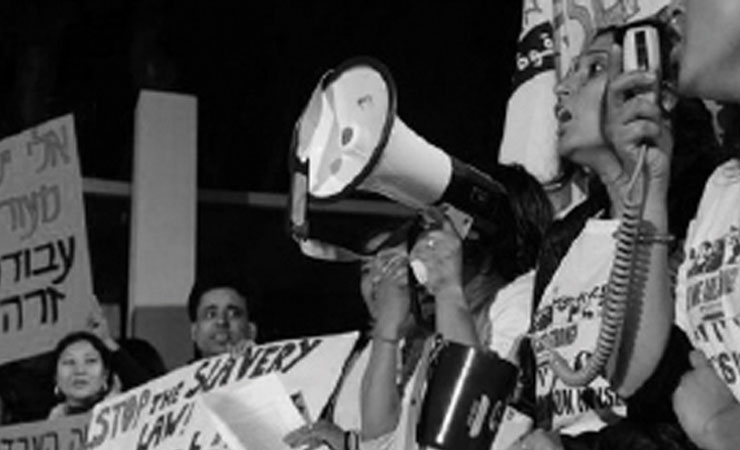In the spirit of Tikkun Olam, Kav LaOved’s driving philosophy is that every worker should be treated equally. It envisions, and works for, an Israel where all workers are respected and valued members of society – regardless of whether they are Israeli or Palestinian, Jewish or Arab, migrants or refugees. Religion, nationality, gender and legal status should never be a barrier to equal and humane treatment. In fact, Israeli labor law explicitly states that all workers are entitled to the same protections. Kav LaOved works to repair a damaged, exploitative labor market, and to transform Israel into a more equitable society.
Today, one of the most vulnerable, and invisible, groups in Israel are migrant agricultural workers who are employed on kibbutzim and moshavim across the country. Currently there are 24, 600 migrant workers employed in the agricultural sector from Thailand, Nepal and Sri Lanka. On average, they work up to 15 hours a day, often in unbearable heat, against the Work and Rest Hours Law (which ensures daily and weekly rest, as well as pay for overtime). When the work day is over, workers (20% of whom are women), make their way back ‘home’. Home usually consists of cramped quarters, with the workers all sharing one space, perhaps a converted tractor shed, a shipping container, or even a converted chicken coop. It is a race to use the one or two showers and toilet available, shared among 30 to 50 workers. There was one case where instead of a shower, the workers had to wash themselves using the garden hose in their employer’s backyard. The garden also doubled as their bathroom.
Because the majority of these workers paid astronomical sums in the form of illegal brokerage fees, they are caught in “debt bondage.” Employers take advantage of this situation, knowing workers are afraid to risk losing their source of income. Thus, migrant workers are seen as a source of cheap and constant labor who don’t need regular rest and recuperation.
Shmita is the Jewish principle of resting the land. According to Jewish law, there is a seven year agricultural cycle. In the seventh year, it is mandated, both by the Torah and by contemporary Jewish law, that the land rests. No agricultural activity is allowed. Next year will be the seventh year in the agricultural cycle and Shmita will once again come into effect.
These agricultural workers should be treated with the same respect and consideration that is given to the land that they are working. The land is allowed to rest, so too should the workers tending it. It is unacceptable that these workers are made to work without an adequate break. It is unacceptable that they are not provided with proper housing. It is unacceptable that they are not seen or treated as fellow human beings.
The backbone of Israeli society has been its agricultural workers. From the early days of the state, the very first pioneers tended to the land, ensuring a thriving agriculture and providing food and jobs. This crucial sector, which sustains society, continues to play the same role. Only that those those fulfilling this vital role come from Thailand, Sri Lanka, and Nepal. They deserve the same respect with which Israel remembers its very first agricultural workers.
By Mika Hackner, Kav LaOved Intern


